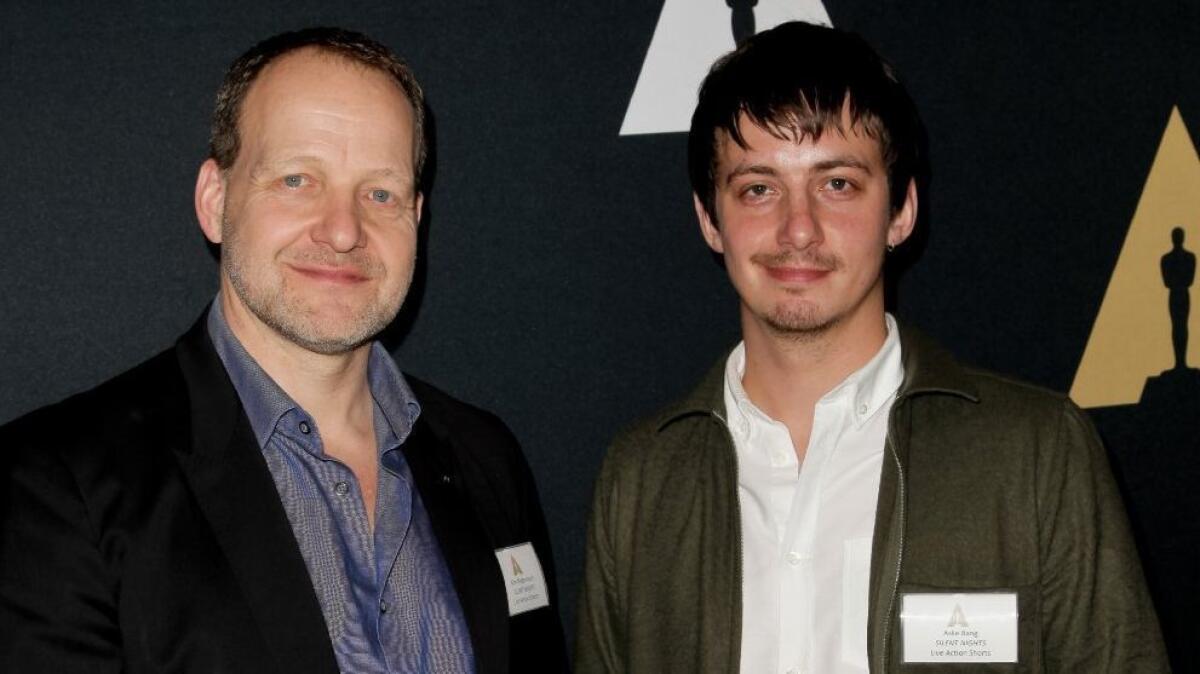Oscar-nominated shorts enter waters features won’t dare

When the year’s best films are name-checked at the Oscars on Sunday night, the list will cover a broad range of topics, including family (“Manchester by the Sea”), communication (“Arrival”), ambition (“La La Land”) and race and sexuality (“Moonlight”).
The most potent global issue of recent years — the Middle East/North African refugee crisis and its fraught questions of security and tolerance — will be nowhere in sight.
But the Oscars have a trick up their sleeve. Fully half of the 10 movies nominated for the non-animated shorts prizes this year are migration-themed — everything from Greek coast guard officers rescuing refugees on rickety boats (the documentary short “4.1 Miles,” one of three in that category) to fraught encounters between Western governments and Muslim immigrants (the French piece “Enemies Within,” one of two in the scripted category).
These movies have the power to turn the Oscars, normally a glitzy and genteel affair, into a political powder keg. With President Trump’s executive order banning many travelers from seven Muslim-majority countries, the shorts inject themselves right into the last month’s headlines.
“The fact that the academy is honoring these films about refugees is telling,” said Daphne Matziaraki, the Greek American filmmaker who directed “4.1 Miles.” “Nominating these movies is in a way a form of protest for what’s happening in this country.”
Winners in one or both categories could well comment on the ban in their acceptance speeches, directly addressing a White House policy while the president, who in the past has live-Tweeted the Oscars, will almost certainly be paying attention.
Shorts have long been an also-ran set of categories, a mid-show by-the-by mostly notable for shredding Oscar ballots or, maybe, a moment of notoriety when a Disney production is upset. But a number of factors this year are converging to change that.
Shorts can be made faster than features, making them more responsive to current events. The scripted shorts also come predominantly from foreign countries (a function of Europeans’ willingness to fund them and the academy’s restrictive rules governing the eligibility of student films that make up much of the form’s American output).
And shorts filmmakers tend to require less money in general, allowing them to gamble on commercially riskier subjects like refugees.
“This is a blinding flash of the obvious, but the shorts are very international, which makes them very diverse,” said Bob Rogers, a two-time Oscar shorts nominee who serves on the Academy of Motion Picture Arts and Science’s Board of Governors for the shorts categories. “And if you’re paying for it all yourself, which you can’t do with Hollywood movies, you get to have much more to say and a lot fewer people to answer to.”
(Incidentally, documentary and foreign films also have some of this potential, which is why one of the nominees for the former, “Fire at Sea,” is also about migrants and the director of one of the latter, “The Salesman’”s Asghar Farhadi, has become a symbol of sorts after he decided to boycott this year’s show in protest of the ban.)
Subjects of several nominated shorts had to sweat out the battle between the White House and the courts before being allowed to come to the Oscars. The central character in the documentary short “Watani: My Homeland” — a Syrian refugee named Hala Kamil whose Free Syrian Army fighter husband was kidnapped by ISIS and is presumed dead — will come to the Oscars after the U.S. 9th Circuit Court of Appeals’ decision to uphold a stay of Trump’s order enabled an eleventh-hour visa. Trump is, of course, expected to issue a revised order.
Whatever happens in the Dolby Theatre, the prevalence of the refugee shorts will puncture the film-centric, controversy-free bubble that normally obtains at the Academy Awards.
“Somebody Tweeted the other day that if Hillary was president we’d all just be talking about movies and TV shows now,” said Bryn Mooser, the head of the L.A.-based RYOT Studio, the company which backed “Watani” along with U.K. production company ITN Prods. “This country is awake in many places it hasn’t been before, and the Oscars reflect that.”
A scripted short that lands with such weight is “Enemies Within.” Selim Azzazi, the France-based son of Algerian immigrants, made the movie to tell of his late father, who grew up in the African country when it was still a French colony.
His film tracks a tense interrogation between an immigrant seeking French citizenship and the suspicious bureaucrat who can grant it — an ethnically tense two-hander that drills down to the personal stakes at the heart of the Muslim immigration debate. What starts out as a sundry conversation turns into an unexpected Sophie’s Choice as the immigrant is forced to choose between giving names of his Muslim friends from a prayer group and the country he badly wants (and deserves) to be a part of.
While it’s set in the 1990s, the issues couldn’t be more relevant. Azzazi views the events in the film as a kind of bridge between the House Un-American Activities Committee (he lived briefly in Georgia and counts “The Crucible” as an influence) and the current immigration debate. seeing in all these moments questions of identity more than security.
“It’s always the same process. There are people who want to be thought as part of the country, and there’s a part of the population that cannot accept that, and it splits the country in half,” he said.
Meanwhile, “Silent Nights,” another scripted shorts nominee, centers on a relationship between a Ghanaian refugee and a local woman he meets at a Denmark absorption center.
“It wasn’t like we sat down and said ‘Let’s make a timely movie,’” said Kim Magnusson, the Danish producer of the film, expressing a sentiment shared by many of the shorts filmmakers. “But the more we got into it the more the world began to evolve. And then when Trump came to power it became prescient.”
Though these issues are hardly new for anyone who has spent time in contemporary Europe, the tensions and stakes are suddenly much higher than they were a year ago, before Brexit and Trump. “I wouldn’t blame people,” Magnusson added, “if they asked if we shot this four weeks ago.”
For Marcel Mettelsiefen’s “Watani,” which follows Kamil’s fleeing of Aleppo with her children when the situation grew dangerous to find a different kind of uncertainty in Germany, the issues are equally newsworthy—and universal. The 40-minute piece, after all, changes a lot when the mother and her young children are out of harm’s way.
“When this developed into a story of a new place it became very difficult to understand how it would be a film,” said Mettelsiefen, who trained as a doctor before he became an acclaimed journalist. “Yes, you have the first day of school and things like that, but I worried it could become boring without images of refugees drowning in the Mediterranean and scenes all the other films had. But then I realized we had the drama of how each of them changes and develops in a new place, which is something everyone can relate to, whether or not they’ve been a refugee.”
The issues for Mettelsiefen also exist outside the film. The director and RYOT Studio decided to bring Kamil in on a visa despite the potential for an immigration-denial at the airport —and despite the decision by Farhadi to stay home — because they thought it could sway public opinion about the ban. “It’s more important than ever that people meet Hala, especially in America,” Mooser said. As of Thursday afternoon, Kamil was set to board a plane in Germany for LAX; Mettelsiefen and RYOT had talked to the German Embassy in the U.S. and were hoping for the best.
Kamil is not the only shorts subject whose Oscar presence was uncertain in the wake of the ban. Raed Saleh, the star of “White Helmets” and leader of the eponymous Aleppo first-responders group, will now also be at the Dolby, as will the Netflix film’s cinematographer, Khaled Khatib.
A statement from director Orlando von Einsiedel and producer Joanna Natasegara noted they remained “cautious about the physical part of entering the country.”
Which films rise to the top Sunday remains to be seen. “Watani” and “White Helmets” are seen as frontrunners among the docs, and “Enemies Within” could well take the prize on the scripted side.
Rogers said he does not believe voters will favor topical films in marking their ballots, though he said he also would not be surprised if one or more of the refugee films win either. “Whether they are political or they are timeless, it’s a chance to celebrate the great art of shorts,” he said.
That is happening commercially too. A theatrical release from the distributor Shorts International compiling many of the movies has played in more than 200 theaters, grossing nearly $2 million in just two weeks. (Many of the movies can also be seen on individual journalism or distributor websites.)
Collectively, the crop of shorts offer a portal into the world’s biggest refugee crisis since World War II. and a kind of accelerated version of how Hollywood examines past crises and wars, which can take decades before they see filmic ferment.
Still, filmmakers say they didn’t always want to tackle the issue too specifically for fear of meeting an indifferent Western audience or simply because they didn’t want to limit the problem to one historical moment.
“One reason I set my movie in the 1990s,” said “Enemies Within” director Azzazi, “is that i wanted to address the contemporary situation but I didn’t want it to be too close to the present. I wanted it to show this has been going on for a very long time.”
“4.1 Miles” director Matziaraki hopes her film has a similarly eye-opening effect in the U.S. and Europe, especially as it is spotlighted at the Oscars.
In her movie, there’s a kind of tragic contrast between the relaxed locals on the Greek island of Lesbos and the desperate, fractured Syrian families that begin appearing on their shores. Matziaraki spent months on land and at sea tracking rescues as they happened, as the consciousness of the comfortable West is dramatically jolted before her — and our — eyes.
“When you read the news you may feel empathy but it’s the other side of the world,” she said in an interview. “I wanted to look at these two realities colliding — the comfort-zone reality and this other reality.
“We’re going through historic times,” she added. “We can’t be detached.”
See the most-read stories in Entertainment this hour »
Twitter: @ZeitchikLAT
More to Read
Only good movies
Get the Indie Focus newsletter, Mark Olsen's weekly guide to the world of cinema.
You may occasionally receive promotional content from the Los Angeles Times.







